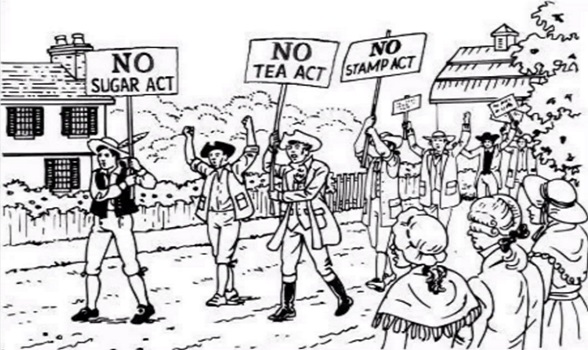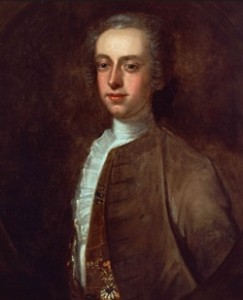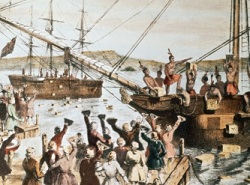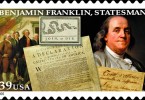
Under British view, America was prosperous enough to bear part of the cost of its defense so Britain set to issue a series of legislative acts to tax colonial residents.
During the 1760s Britain imposed a series of taxes on its American colonies (1764 Sugar Act and Currency Act, 1765 Stamp Act and Quartering Act, 1767 Townshend Act) to pay for its increasing national debt and cost of military protection of its American colonies. The colonies protested against their implementation under the slogan “No Taxation without Representation”. One of the first actions to unite the colonies was the formation of Committees of Correspondence to share information among colonies and coordinate actions. Several revolts had occurred by the time Franklin obtained the incendiary letters written by Governor Hutchinson of Massachusetts and Lieutenant Governor Andrew Oliver.
The Hutchinson Letters

Thomas Hutchinson, Governor of Massachusetts.
In December 1772, while residing in London as agent for the House of Representatives of Massachusetts, Franklin received a package containing 13 letters by an anonymous sender. The letters were correspondence of Massachusetts Governor Thomas Hutchinson and Lieutenant Governor Andrew Oliver with English authorities. In these letters Hutchinson explained the revolts in the colony against taxes and recommended that colonial government should be made independent from provincial assemblies and the gradual reduction “by degrees” of English liberties. He also urged to send more troops to keep rebels under control advocating repressive measures against agitators in the colonies.
Understanding the nature of these letters, Franklin sent them to Samuel Adams who was the head of the Massachusetts Committee of Correspondence. Franklin authorized the letters to be shown to members of the Committee but not copied or published.
Massachusetts Speaker Thomas Cushing wrote a letter to Franklin asking if he could ease the restriction of its circulation. Because of its inflammatory nature, Cushin presented the content of the letters before the Massachusetts House on June 2nd, 1773. The House concluded that Hutchinson intended to overthrow the constitution and decided to appoint a committee to petition the crown for Hutchinson’s and Oliver’s removal. Despite Franklin’s wishes and because of public interest the letters were published in the Boston Gazette in June 1773 causing political and civil revolt in the city.
In September 1773 Franklin published in the Public Advertiser in London “Rules by Which a Great Empire May Be Reduced to a Small One” and “Edict by the King of Prussia”. Both are satires that criticize British attitude towards its colonies.
Who leaked the Hutchinson Letters?
Governor Hutchinson obtained a copy of the letter Franklin wrote to House Speaker Cushin and sent it to Lord Dartmouth, the colonial secretary. General Thomas Gage, commander-in-chief in America was ordered to obtain the original so that Franklin could be charged of treason. Gage was unable to obtain the original letter as Cushin may have destroyed it to protect Franklin. Without solid prove Franklin could not be prosecuted. Meanwhile two men, William Whately and John Temple accused each other of leaking the letters and were challenged to a duel. In order to avoid a tragedy, Franklin declared that it was he who obtained them and gave them to the Massachusetts Assembly. He never mentioned who obtained the letters for him.
This is the letter Franklin sent to the London Chronicle assuming his responsibility.
Printed in The London Chronicle, Dec. 23-25, 1773
To the Printer of the London Chronicle.
Craven-street, Dec. 25, 1773.
Sir,
Finding that two Gentlemen have been unfortunately engaged in a Duel, about a transaction and its circumstances of which both of them are totally ignorant and innocent, I think it incumbent on me to declare (for the prevention of farther mischief, as far as such a declaration may contribute to prevent it) that I alone am the person who obtained and transmitted to Boston the letters in question. Mr. W. could not communicate them, because they were never in his possession; and, for the same reason, they could not be taken from him by Mr. T. They were not of the nature of “private letters between friends:” They were written by public officers to persons in public station, on public affairs, and intended to procure public measures; they were therefore handed to other public persons who might be influenced by them to produce those measures: Their tendency was to incense the Mother Country against her Colonies, and, by the steps recommended, to widen the breach, which they effected. The chief Caution expressed with regard to Privacy, was, to keep their contents from the Colony Agents, who the writers apprehended might return them, or copies of them, to America. That apprehension was, it seems, well founded; for the first Agent who laid his hands on them, thought it his duty to transmit them to his Constituents.
B. Franklin,
Agent for the House of Representatives of the Massachusetts-Bay.
Consequences of the Hutchinson Letters

The Boston Tea Party was organized by the Sons of Liberty and led by Samuel Adams.
News of the Boston Tea Party, a protest on taxation by residents of Boston, which had just occurred in December 1773, reached London on January 20. The Houses of Parliament declared Massachusetts to be in rebellion. A hearing on a petition from Massachusetts for Hutchinson’s and Oliver’s removal was scheduled to take place on January 29. During the hearing and in front of the Privy Council, Franklin was accused by British Solicitor General Alexander Wedderburn of illegally obtaining the letters for the purpose of inciting rebellion in the colonies. He was accused of being a thief and of dishonor. Franklin refused to respond to Wedderburn’s accusations and to reveal his source arguing that his action was not illegal as they were not private letters. They were written by public officers regarding public affairs so it was his duty to let know those who were influenced by those measures. As a consequence the Board of Trade dismissed Franklin of his post as Postmaster General.After the Boston Tea Party, Britain passed the Coercive Acts, also known as Intolerable Acts, to punish Massachusetts for its actions. Hutchinson was recalled and the governorship was given to Thomas Gage. Effigies of Hutchinson, Oliver and Wedderburn were burned in Boston and Philadelphia.
Between 1773 and 1775 Franklin was involved in two series of negotiations to restore the relationship between Britain and America, a relationship that was at the moment beyond reconciliation. Franklin returned to America in early 1775 where he served in the Second Continental Congress.

